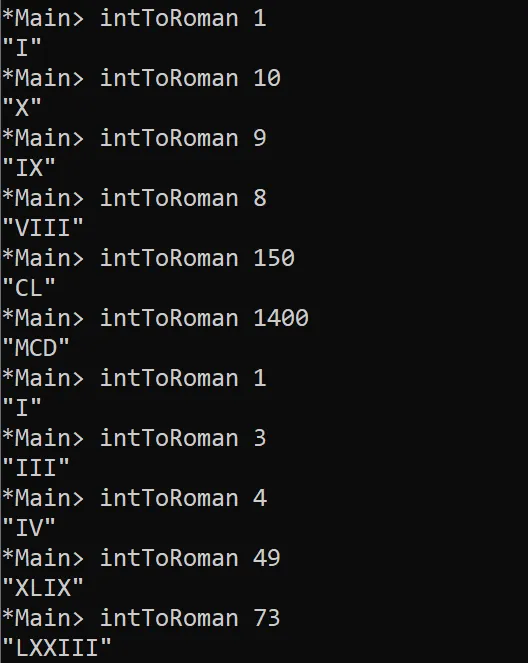我最近开始学习Haskell,并正在尝试编写基本的Haskell函数。我写了一个名为“intToRoman”的函数,它应该将整数转换为罗马数字。它将数字分成整数列表(1400-> [1,4,0,0]),并将每个数字转换为罗马数字,考虑到列表长度来确定是否为千或百。但是,它不会停止并检查零。例如,数字1400将返回:
这里是代码本身:
MCD** Exception: Map.!: given key is not an element in the map
CallStack (from HasCallStack)
这里是代码本身:
mapInttoRoman:: M.Map Int String
mapInttoRoman = M.fromList
[(1,"I"),(4,"IV"),(5,"V"),(9,"IX"),(10,"X"),(40,"XL")
,(50,"L"),(100,"C"),(400,"CD"),(900,"CM"),(500,"D"),(1000,"M")]
listOfInt :: Int -> [Int]
listOfInt 0 = [ ]
listOfInt c = listOfInt(c`div`10) ++ [c`mod`10]
duplicate :: String -> Int -> String
duplicate string n = concat $ replicate n string
intToRoman :: Int -> String
intToRoman 0 = ""
intToRoman c = createInt x (len-1)
where x = listOfInt c
len = length x
createInt y xz = findRoman (head y) xz ++ createInt(drop 1 y)(xz-1)
where findRoman b l
| l < 1 = mapInttoRoman M.! b
| b == 0 = " "
| l == 3 = duplicate (mapInttoRoman M.! (10^l)) b
| b == 1 = mapInttoRoman M.! (10^l)
| otherwise = mapInttoRoman M.! (b*10^l)

| b == 0 = " "分支无法捕获此情况,因为| l < 1 = ..分支首先被检查。你可以改变它们的顺序。(然后它会失败,因为你尝试获取一个空列表的头部,所以你需要为createInt [] _ = ""添加一个基本情况。) - that other guy